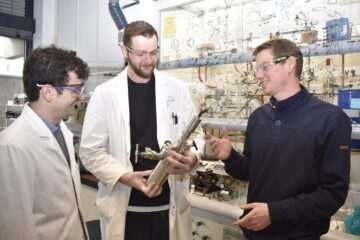Discovery in the evolution of the immune system absorbing cells

Led by Dr J Oriol Sunyer, of the Faculty of Veterinary Medicine at the University of Pennsylvania, and formed by researchers from Philadelphia, St Louis and Idaho (USA) and by Dr Lluís Tort of the Universitat Autònoma de Barcelona, the group has been able to show that B cells in fish as well as in amphibians are capable of strong phagocytosis both in in vivo and in vitro experiments. The work has been published in Nature Immunology, the most prestigious journal worldwide in the field of immunology.
According to Dr Sunyer, “this is important so that we can understand not only how the immune systems of fish and amphibians work but also the origin and composition of the immune systems of humans and mammals”. The work concludes that there is an evolutionary relationship between macrophages and cells by which both cell types derive from a common, ancestral cell with functional properties of both cells. So though the B cells of lower vertebrates (fish and amphibians) are still capable of phagocytis while they are producing antibodies, the B cells of higher vertebrates are no longer capable of phagocytis. The latter specialise almost exclusively in functions of the adaptive immune response.
It is most probable that the less-elaborated, restrictive adaptive immune response of fish and amphibians makes the preservation of phagocytosis an evolutionary advantage to B cells in their defence against pathogens. One cannot forget that fish have had a significant evolutionary success, since nearly 50% of vertebrate species belong to this group and they are constantly in contact with a vast multitude of microorganisms in the water. According to Dr Sunyer, “From a practical perspective, this discovery will be used in the near future to produce a new design of vaccines for fish in order to stimulate phagocytosis in antibodies for B cells, increasing the effectiveness of the vaccine”.
The study of comparative biology remains an important source of scientific knowledge. Several years ago, the same researchers demonstrated the great versatility and power of the innate immune response of the complement system in lower vertebrates, whereas mammals have developed greater effectiveness and specialisation in the adaptive mechanism of antibodies.
Media Contact
More Information:
http://www.uab.esAll latest news from the category: Life Sciences and Chemistry
Articles and reports from the Life Sciences and chemistry area deal with applied and basic research into modern biology, chemistry and human medicine.
Valuable information can be found on a range of life sciences fields including bacteriology, biochemistry, bionics, bioinformatics, biophysics, biotechnology, genetics, geobotany, human biology, marine biology, microbiology, molecular biology, cellular biology, zoology, bioinorganic chemistry, microchemistry and environmental chemistry.
Newest articles

Lower dose of mpox vaccine is safe
… and generates six-week antibody response equivalent to standard regimen. Study highlights need for defined markers of mpox immunity to inform public health use. A dose-sparing intradermal mpox vaccination regimen…

Efficient, sustainable and cost-effective hybrid energy storage system for modern power grids
EU project HyFlow: Over three years of research, the consortium of the EU project HyFlow has successfully developed a highly efficient, sustainable, and cost-effective hybrid energy storage system (HESS) that…

Safer alternative for an explosive reaction
The chemical industry has been using a reaction with explosive chemicals for over 100 years – now Mülheim scientists have discovered a safer alternative. The Ritter Group of the Max…





















